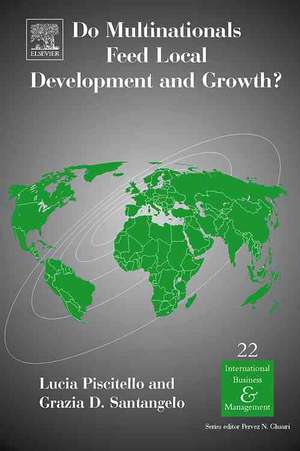Do Multinationals Feed Local Development and Growth?: Devolution, Transport and Policy Innovation: International Business and Management, cartea 22
Editat de Grazia D. Santangelo, Lucia Piscitelloen Limba Engleză Hardback – 31 aug 2007
•To what extent do foreign MNEs represent a crucial source of spillovers for local domestic companies? And which are the “working mechanisms” of these technological transfers?
•How can development and growth processes take off? And are there privileged sectors and locations?
•Do MNEs benefit from significant technological transfer from their foreign activities? And what modalities and mechanisms do MNEs adopt to value technological transfers? Which are the main advantages stemming from them?
•Do MNEs’ performances also benefit in terms of labour productivity and employment?
The answers provided highlight that recursive elements and interaction between international institutions, government policies and strategies of MNEs are main mechanisms to factors that influence development and growth, thus offering new insights to policy makers.
*Studies the relationship of the MNE with it's home and host countries
*Analyzes the effect of MNEs upon local development and growth
*Contributes to define the role for public industrial and economic policies
Preț: 857.21 lei
Preț vechi: 1113.26 lei
-23% Nou
Puncte Express: 1286
Preț estimativ în valută:
164.03€ • 170.92$ • 135.81£
164.03€ • 170.92$ • 135.81£
Carte tipărită la comandă
Livrare economică 03-17 aprilie
Preluare comenzi: 021 569.72.76
Specificații
ISBN-13: 9780080453606
ISBN-10: 0080453600
Pagini: 247
Dimensiuni: 161 x 232 x 23 mm
Greutate: 0.51 kg
Editura: Emerald Group Publishing Limited
Seriile International Business & Management, International Business and Management
ISBN-10: 0080453600
Pagini: 247
Dimensiuni: 161 x 232 x 23 mm
Greutate: 0.51 kg
Editura: Emerald Group Publishing Limited
Seriile International Business & Management, International Business and Management
Public țintă
Academic researchers in international business are primary audience. Secondary audience includes academics in the areas of regional studiesn and development economics.Cuprins
1.Introduction
Impact on host development and growth
2.The Role of The Sectoral Composition of Foreign Direct Investment on Growth
3.Foreign direct investment and economic development: Opportunities and limitations from a developing country perspective
Knowledge flows in local context
4.MNEs’ Location Behaviour and Industrial Clustering
5.Knowledge localisation: A Regional analysis of foreign-owned Technology activities in Germany
6.Global and local knowledge linkages: the case of MNC subsidiaries in Argentina
Impact on home competitiveness
7.The Impact of Knowledge Transfer on Multinationals’ Performance
8.Home country effects of investing abroad: Evidence from Italy
9.Conclusions
Impact on host development and growth
2.The Role of The Sectoral Composition of Foreign Direct Investment on Growth
3.Foreign direct investment and economic development: Opportunities and limitations from a developing country perspective
Knowledge flows in local context
4.MNEs’ Location Behaviour and Industrial Clustering
5.Knowledge localisation: A Regional analysis of foreign-owned Technology activities in Germany
6.Global and local knowledge linkages: the case of MNC subsidiaries in Argentina
Impact on home competitiveness
7.The Impact of Knowledge Transfer on Multinationals’ Performance
8.Home country effects of investing abroad: Evidence from Italy
9.Conclusions
Recenzii
A central characteristic of the contemporary multinational is the way in which it builds key elements of its networked global competitiveness from carrying out different facets of its value-adding activities (productive and creative) in different locations. Since this builds on the specific current characteristics of these separate locations it provokes vital questions as to how this MNE strategy affects the development and growth of these countries and regions. The papers contained in this volume make a major contribution to understanding these issues, both through careful articulation of the ways MNEs’ strategies interact with locations and through detailed investigation of the technological spillover and transfer mechanisms that can determine benefits (or costs) to host and home economies. The book therefore offers new and valuable insights to readers interested in the strategy and political economy of MNEs and policy dimensions relating to specific regions.
Robert Pearce, Professor of International Business, Reading University Business School, UK
A central characteristic of the contemporary multinational is the way in which it builds key elements of its networked global competitiveness from carrying out different facets of its value-adding activities (productive and creative) in different locations. Since this builds on the specific current characteristics of these separate locations it provokes vital questions as to how this MNE strategy affects the development and growth of these countries and regions. The papers contained in this volume make a major contribution to understanding these issues, both through careful articulation of the ways MNEs strategies interact with locations and through detailed investigation of the technological spillover and transfer mechanisms that can determine benefits (or costs) to host and home economies. The book therefore offers new and valuable insights to readers interested in the strategy and political economy of MNEs and policy dimensions relating to specific regions. Robert Pearce, Professor of International Business, Reading University Business School, UK
Robert Pearce, Professor of International Business, Reading University Business School, UK
A central characteristic of the contemporary multinational is the way in which it builds key elements of its networked global competitiveness from carrying out different facets of its value-adding activities (productive and creative) in different locations. Since this builds on the specific current characteristics of these separate locations it provokes vital questions as to how this MNE strategy affects the development and growth of these countries and regions. The papers contained in this volume make a major contribution to understanding these issues, both through careful articulation of the ways MNEs strategies interact with locations and through detailed investigation of the technological spillover and transfer mechanisms that can determine benefits (or costs) to host and home economies. The book therefore offers new and valuable insights to readers interested in the strategy and political economy of MNEs and policy dimensions relating to specific regions. Robert Pearce, Professor of International Business, Reading University Business School, UK





